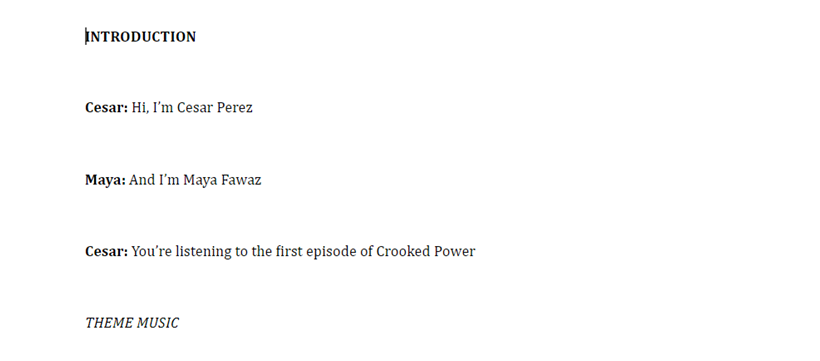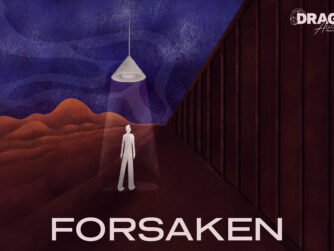Crafting a podcast with a whole other person is hard enough; creating a podcast remotely is even harder. When Cesar Perez booked his flight home to Ecuador last summer, him and Maya Fawaz scratched their heads for answers. How on earth were they going to write several hour-long podcast scripts across two countries and several time zones?
Nearly a year later, the two have figured out their script writing flow. With the help of Google Docs and many Zoom calls, the pair have mastered the art of remote script writing for podcasts. As they continue writing out the rest of the podcast, Perez and Fawaz are ready to impart their wisdom to other podcasters who might still be working remotely, be it for COVID-19 safety or vast locational differences.
Here are seven script writing tips from the co-hosts of “Crooked Power”:
1. Be flexible
After the outlining stage, script writing seems like it should be easy. You follow the outline set in place, but most often, that’s not always the case. The pair found that through the writing process, some items in the outline didn’t quite fit anymore. They learned to go with the flow and to be open to rethinking the outline as the scripts progressed.
“The first scene that we wrote is now in the middle of the series. It’s in the middle of episode three,” Perez said. “I think that just speaks to being flexible with moving stuff really all over the place.”
2. Have many conversations about the story
When creating a podcast as part of a team, especially when the story focuses on one of the team members like with “Crooked Power,” it helps to continue discussing the story, even after it has been discussed countless times.
With Fawaz and Perez, these conversations help reveal details that might have been forgotten in earlier stages of the podcasting process. Other times, these conversations yielded organizational ideas. For Fawaz, these conversations play a huge role for her, since she is helping to tell Perez’s personal story.
“Those random conversations, these tangents are work, too,” Perez said. “We get to know more of the emotional component of the story.”
3. Figure out the voice for the podcast and the dynamic you want between the hosts
Both Fawaz and Perez had to figure out what was Fawaz’s role in the story if it was not her personal story.
“At like one point, I remember talking to Cesar about things, and I was like, ‘What if they cut me out completely of an episode?” Fawaz said.
The two had a tough conversation about what their dynamic would look like in the scripts since both were emotionally invested in the story just as much as they were physically invested in the project. It was this conversation that enabled the hosts to move forward with script writing where both parties were comfortable.
They did the same thing to figure out the tone of the podcast. In this way, Fawaz and Perez could remain on the same page despite being miles and miles apart.
4. Get outside feedback from editors and focus groups along the way
“We’re getting feedback from the focus groups that are telling us, ‘Oh, we like this. We didn’t like that,’” Fawaz said. “We’re still shaping things now to figure out how to go forward with the next episodes of how to tweak things.”
Ultimately, Fawaz and Perez want their listeners to be able to follow the story and enjoy listening to it, so they are involving listeners before the podcast audio is fully recorded.
Beyond focus groups, they are constantly discussing the scripts with Executive Producer Robert Quigley and Senior Producer Katey Psencik to avoid getting tunnel vision.
5. Write in scenes
Script writing exposed Perez and Fawaz to writing in scenes for the first time. It was nothing like the journalism stories they had written before, which were much more straightforward and to the point. After learning to write in scenes, they found it helped with the flow of script writing.
“I wish we would have known sooner to think in scenes because Katey and Quigley told us that after we wrote our second episode,” Fawaz said. “They said find a scene to base the information around. Don’t just leave information hanging out because that’s kind of boring, and there’s nothing really grounding it.”
6. Trust your partner
There is currently no way for Perez and Fawaz to sit over a laptop in the same room and discuss scripts. Instead, they frequently meet over Zoom. At times, they will write sections of the script together, but often they will divide and conquer. After writing their own sections, they reconvene and edit each other thanks to an established level of trust.
“It’s a bit tricky because Maya is sometimes writing a very personal part of the story, and I’m OK with it,” Perez said. “I really trust Maya to capture the emotional, personal stuff, and she does a good job.”
7. Just rip off the bandage
Sometimes, starting the script writing process is the hardest part of all. It can seem scary to finally move into the scripting stage, never knowing if the outlines are ready to handle the next step. The best solution? Just start writing.
“There’s a lot of stuff that you won’t realize until you start script writing: things that you need to research, people you should contact,” Fawaz said. “Just have have that sh-tty first draft.”
“Oh,” Perez said. “And ours was.”









